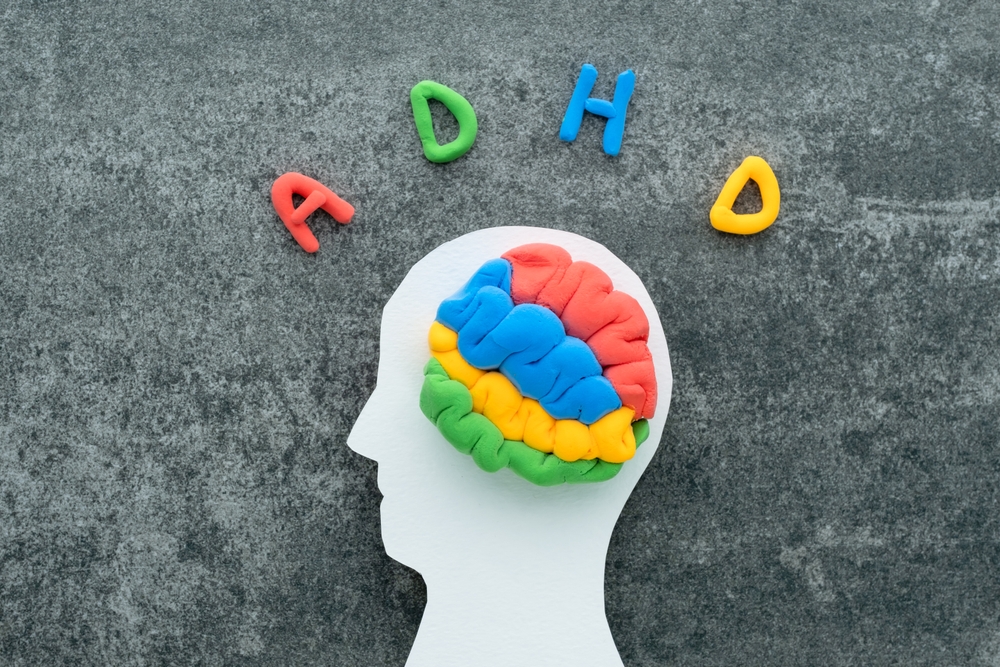Last Updated:
July 21st, 2025
ADHD and Addiction | Symptoms and Support Options
What is ADHD?
ADHD, or Attention Deficit Hyperactivity Disorder, is a condition that affects both children and adults, influencing focus, impulsivity and energy levels in ways that can impact daily life.
While many associate ADHD with being easily distracted or overly energetic, it’s a much more complex condition that varies from person to person. Some individuals may struggle with staying organised, while others find it difficult to sit still or manage their impulses.
It’s estimated that around 5% of children worldwide have ADHD, with approximately 3% to 4% of adults in the UK also living with the condition. However, the true number is likely higher, as the data collected on ADHD in the UK is incomplete, making it difficult to capture the full extent of those seeking, waiting for or already diagnosed. This means many people may be living with ADHD without realising it or without access to the right support.

Are there different types of ADHD?
ADHD isn’t a single condition with identical symptoms; it actually comes in three different types, each with its own challenges and severity levels. Understanding these differences can help individuals recognise how ADHD affects them or someone they care about.
Predominantly inattentive presentation (often called ADD)
This type of ADHD is marked by difficulties with focus and organisation rather than hyperactivity. It’s often harder to spot, especially in adults or children who aren’t disruptive.
- Struggles to maintain attention, especially in lengthy or repetitive tasks
- Frequently loses things like keys, paperwork or school materials
- Easily distracted by unrelated thoughts or external noises
- Appears forgetful or absent-minded in daily life
Predominantly hyperactive-impulsive presentation
This type is more commonly associated with what people picture when they think of ADHD. Here are some of the most common symptoms associated with this type of ADHD:
- Fidgeting or tapping hands and feet, struggling to stay seated
- Interrupting conversations or blurting out answers before a question is finished
- Feeling restless and constantly needing to move
- Acting without thinking, sometimes leading to risk-taking behaviour
Combined presentation
This is the most common type of ADHD, where both inattentive and hyperactive-impulsive symptoms are present. It includes difficulties with focus organisation, impulsivity and restlessness, making everyday tasks even more challenging.
Each type of ADHD presents differently from person to person, and symptoms can change over time.
The link between addiction and ADHD
ADHD and addiction often go hand in hand, creating unique challenges for those affected. Studies suggest that up to 50% of people with ongoing ADHD symptoms also struggle with substance use disorders. This connection isn’t just a coincidence: ADHD itself increases the risk of addiction, making it more difficult to resist or manage substance use.
One of the key reasons for this link is the impulsivity and difficulty with self-regulation that often comes with ADHD. In social situations, this can lead to riskier choices, such as experimenting with drugs or alcohol without fully considering the consequences. Over time, these behaviours can develop into long-term substance use issues.
Research has identified several ways ADHD can influence substance use, particularly in adolescents:
- Earlier onset of substance use: Young people with ADHD are more likely to start using drugs or alcohol at an earlier age, increasing their risk of developing addiction later in life.
- Longer-lasting addiction: ADHD-related impulsivity and difficulty with self-discipline make it harder for individuals to stop using substances, leading to a prolonged struggle with addiction.
- Increased likelihood of using multiple substances: Those with ADHD are more likely to transition from alcohol or one drug to using multiple substances, which can make recovery more complex.
- Faster progression to dependence: The gap between first trying a substance and becoming dependent on it is often shorter in individuals with ADHD, as their brain constantly seeks stimulation and reward.
- Challenges in treatment: ADHD symptoms such as forgetfulness, restlessness and difficulty following routines can interfere with addiction treatment, making it harder to stay engaged in recovery programmes.
Recognising this link between ADHD and addiction is vital in ensuring individuals receive the right support. Early diagnosis and tailored treatment can help reduce the risk of substance use becoming a long-term issue.
Signs of ADHD and addiction
If you’re concerned that someone with ADHD may also be struggling with addiction, it can be difficult to distinguish between the two. Many traits of ADHD can also be present in addiction, making it challenging to tell where one ends and the other begins.
However, there are some key signs that could suggest a problem with substance use alongside ADHD.
- Escalating impulsivity: While impulsiveness is a common trait of ADHD, a sudden increase in reckless behaviour, especially around substance use, could signal an issue. This might include taking higher risks, using substances in dangerous situations or neglecting important responsibilities.
- Changes in coping mechanisms: Many people with ADHD struggle with emotional regulation, but if they begin turning to substances as a way to manage stress, frustration or boredom, it could indicate a developing addiction.
- Worsening focus and motivation: ADHD can naturally cause difficulties with attention and motivation, but addiction may amplify this. If someone is becoming more disengaged from work, school or hobbies they once enjoyed, it may be worth considering if substance use is playing a role.
- Withdrawal from support networks: Social struggles can already be a challenge for those with ADHD but if someone starts avoiding family, friends or responsibilities more than usual, especially if they were previously sociable, it could be a sign of substance dependence.
- Increased financial or legal issues: While ADHD can contribute to money management difficulties, addiction often brings more noticeable financial strain, such as borrowing money frequently, missing payments or engaging in risky behaviour to obtain substances.

What happens if you’re diagnosed with both ADHD and addiction?
When someone has both ADHD and addiction, it’s known as a dual diagnosis. This means two conditions are affecting each other, often making symptoms more intense. Impulsivity, inattention and restlessness from ADHD can make it harder to control substance use, while addiction can worsen ADHD symptoms, creating a difficult cycle to break.
Treatment needs to address both conditions together. If necessary, this may involve detox, followed by therapies that help with impulse control and focus. Approaches like dialectical behaviour therapy (DBT), one-on-one counselling and even holistic methods like yoga or art therapy can be beneficial.
Recovery with ADHD can feel more challenging, but with the right support, it’s absolutely possible. If you or someone you care about is struggling with both ADHD and addiction, seeking help tailored to both conditions can make all the difference in achieving long-term recovery.
Addiction Helper is here to guide you with the right treatment options. Contact us today to take the first step.
Our compassionate team are ready and available to take your call, and guide you towards lasting the lasting addiction recovery you deserve.
Frequently Asked Questions
(Click here to see works cited)
- “Attention Deficit Hyperactivity Disorder (ADHD) Programme Update.” NHS Choices, NHS, www.england.nhs.uk/long-read/attention-deficit-hyperactivity-disorder-adhd-programme-update/. Accessed 10 Mar. 2025.
- Sullivan MA, Rudnik-Levin F. Attention deficit/hyperactivity disorder and substance abuse. Diagnostic and therapeutic considerations. Ann N Y Acad Sci. 2001 Jun;931:251-70. doi: 10.1111/j.1749-6632.2001.tb05783.x. PMID: 11462745.

